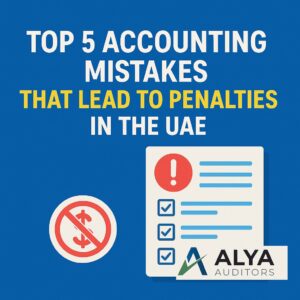
Top 5 Accounting Mistakes That Lead to Penalties in the UAE – 2025 Guide
Top 5 Accounting Mistakes That Lead to Penalties in the UAE In the evolving regulatory landscape of the UAE, businesses must remain vigilant when it
Home » The importance of corporate economic substance for businesses in the UAE
As a member of the OECD inclusive framework, UAE is committed to ensuring that the UAE’s legal and commercial framework is in line with global standards. As apart of this commitment, Economic Substance Regulations (“ESR”) were introduced to the UAE in April 2019.
These regulations are applicable to all natural or legal person licensed to carry out a ‘Relevant Activity’ in the UAE. This includes licensees in Free Zones, Financial Free Zones and Offshore Free Zones. The regulations apply to financial year commencing from 1 January 2019.
Whilst each jurisdiction will have its own approach, here we highlight some of the key points tax authorities are expected to consider when determining whether a company has sufficient economic substance.
These regulations are applicable to all natural or legal person licensed to carry out a ‘Relevant Activity’ in the UAE. This includes licensees in Free Zones, Financial Free Zones and Offshore Free Zones. The regulations apply to financial year commencing from 1 January 2019.
Determining where a company is tax resident is important as this will typically be the jurisdiction that has primary taxing rights over the company’s income. A company will generally be tax resident in the jurisdiction in which it is incorporated, but circumstances can arise where another jurisdiction also claims primary taxing rights.
In the UAE, for example, case law has determined that a company that is not incorporated in the UAE is tax resident in the UAE if it is ‘centrally managed and controlled’ in the UAE The test applies to identify where the highest level of management and control over a company’s affairs is exercised (ie where the key strategic business decisions are made), as opposed to decisions over normal day to day operational matters.
Where more than one jurisdiction claims primary taxing rights and a double tax treaty applies, the treaty will typically require consideration of where such strategic decisions take place in determining the territory of residence recognised under the treaty. This will generally be where board meetings take place, but the location of such meetings is not necessarily conclusive and the facts of each case need to be considered on their own merits.
It is therefore important to ensure that management’s actions do not cause the company to unintentionally become tax resident in another jurisdiction. Being resident in more than one jurisdiction can give rise to unexpected tax liabilities and compliance costs, either through dual residence itself, or the need to claim relief from double taxation where available.
A number of factors will be taken into account by tax authorities when considering where control over a company is exercised, such as:
As a minimum, therefore, board minutes should evidence key strategic decisions being made in the meeting held at the appropriate location. If the board of directors does not, in practice, make the key decisions, tax authorities will look to understand who does, and where.
Tax residence and corporate economic substance are ultimately matters of fact. However, it is important for companies to take necessary steps to ensure they do not inadvertently become tax resident in another jurisdiction.
With global corporate tax rates generally falling, there is likely to be pressure on jurisdictions to prevent the loss of tax receipts. This could therefore bring the topic of corporate residence even more to the fore as countries seek to protect their tax base.
If you are concerned about whether your business operations meet the ESR tests and compliance obligations, our team of specialists can help. Alya Auditors offers a range of services to help you in this journey.
We’re a leading firm of chartered accountants & VAT/Tax advisers supporting entrepreneurs, high net worth individuals, family offices and growing businesses in UAE.

Top 5 Accounting Mistakes That Lead to Penalties in the UAE In the evolving regulatory landscape of the UAE, businesses must remain vigilant when it

🛑 ⏳ 31 July 2025 – Last Chance to Avoid AED 10,000 Corporate Tax Penalty in the UAE! 📢 URGENT: 31 July 2025 is Your

Top Audit Firms in Dubai 2025 | Best Audit Companies in the UAE As the UAE’s regulatory landscape evolves, choosing the right audit firm in
Truly, let us know what service you are looking for and hence we can get back to you with more details.
Silver Tower, Business Bay. PO Box: 41102, Dubai, UAE.
Sharjah Airport Free Zone PO Box: 120403 Sharjah, UAE.
+971 48769377
+971 52 9750690 , +971 50 522 1035
Mon – Fri : 8:30 AM – 6 PM
Saturday – 9 AM – 5 PM
Sunday – Closed
© Alya Auditors 2022 All Rights Reserved